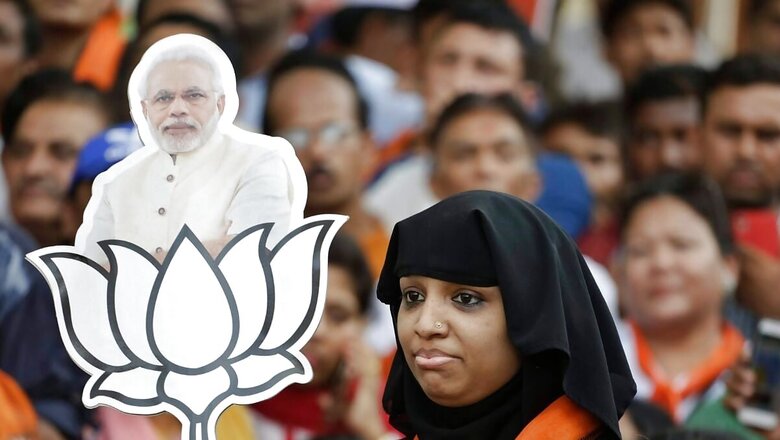
views
Recently, I was at a Muslim friend’s dinner party, and as it warmed up the chatter inevitably turned to politics, more specifically the coming general election and the electoral choices before Muslims.
It was a gathering of mostly disillusioned Congress supporters weighing their options. Among them, many had stopped voting for the Congress long ago, though some returned to it after the Bharatiya Janata Party’s 2014 landslide victory hoping to strengthen it as a credible ‘secular’ alternative.
Which hasn’t, of course, worked as the 2019 elections showed, and the projections for the 2024 polls suggest. So, where do they go from here?
The honest answer is that nobody really knows. The discussion revealed a community deeply divided and confused, but significantly I heard voices open to contemplating a punt on BJP. A view confirmed by my conversations with others in the community.
With the BJP poised to return to power for a third consecutive term and no alternative in sight for years to come, Muslims are finally starting to smell the coffee and come to terms with the fact that the party is not going away any time soon.
The fragile state of the INDIA alliance has put paid to any lingering hope they might have had of seeing the back of the BJP. This has prompted a grudging rethink of their informal voting boycott of the party.
A strategy which, far from hurting the BJP, has on the contrary blown away the self-serving myth about the so-called ‘Muslim factor’ in winning elections. The BJP has shown that the Muslim vote is irrelevant if you are able to mobilise enough Hindu votes.
As this realisation begins to sink in, the debate in the Muslim community is shifting from a blanket “never, never” to a willingness to gamble on the BJP.
If the trend consolidates, then for the first time, we could see many floating Muslim voters go for the BJP in the May elections. The thinking is driven by a rare pragmatism not generally associated with the community.
But, equally, it reflects its increasing frustration with the so-called secular parties which have done little to address Muslim concerns and have instead joined the scramble for Hindu votes.
The community feels betrayed by these parties and, in retrospect, many believe that the “no truck with BJP” strategy was a mistake.
Young Muslims have emerged as the sharpest critics of the community leadership. They believe it was a “folly” to put all its eggs in the Opposition basket to spite the BJP, and favour a more flexible approach.
Many “Pasmanda” Muslims, representing the most backward Muslims, already vote for the BJP. It won about nine percent of the Muslim vote in the last general election, according to a Reuters study.
What is significantly different this time is the likelihood of upper class (“Ashraf”) Muslims switching to the BJP. How many would ultimately take the plunge is uncertain but the fact that they are even thinking about it marks a fundamental shift in their attitude towards it.
The social media site, Quora, is awash with Muslims explaining why they would vote for the BJP in the coming elections. Here’s a random selection.
“He has done tremendous job. Economy is in much better shape. Price are all time low. Toilets took 70 years to reach rural people. So imagine what previous government has done for us. Gas, electricity is reaching every part of country,” an ‘anonymous’ respondent says.
Another, responding to the criticism that “he (Modi) only speaks about Hindus”, says: “He is Hindu and if he is proud of that we are no one to judge as we are proud of our culture. If you go to Gujarat, you will see majority Muslims support Modi because of work he has done there. Whatever he is doing he is keeping 140 crore Indians in mind. We generally vote for candidates of our own community. But still we are lagging behind as they are not giving more importance to our development. Our Muslims leaders know when election time come we will take out Muslims’ victim card and people will vote for us. Instead of hating Modi, we should take his help to make lives of our community better.”
There is independent anecdotal evidence to support the broader Muslim mood reflected in these posts, particularly in Uttar Pradesh.
For all their criticism of chief minister Yogi Adityanath’s ideological fervour, Muslims acknowledge that he runs a relatively efficient administration which is doing some good work in improving public services and delivering Prime Minister Narendra Modi’s welfare schemes, as the following Quora post from a supposedly Muslim resident of UP points out.
“I am from a prominent family, therefore not revealing my identity. Yes, I will vote for Modi. I live in a small district of Uttar Pradesh, named Sant Kabir Nagar. This is what I witnessed in past 6 years: Good roads by Modi and Yogi. Better electricity. Better government hospitals and schools. They are not like private but has (sic) become very good. Infrastructure needs to be improved. Work is available in the state. Now people don’t need to go to other states. LPG connection is provided for free and cylinders at subsidised rates.”
A standard line I’ve heard is: “Kaam to kiya hai Yogi ne (there is no doubt Yogi has done work),” even as they criticise his “communal” politics.
However, they refuse to admit that they have either ever voted or intend to vote for the BJP for fear of being accused of betrayal. My own guess is that a lot more Muslims vote for the BJP than is generally assumed.
The BJP, meanwhile, has stepped up efforts to attract Muslim voters. These include recruiting high-profile Muslims who can mould opinion in the community. Last year, it nominated the former Vice-Chancellor of Aligarh Muslim University, Tariq Mansoor, to the UP legislative council, and also made him the party’s national vice-president.
His main job is to reach out to fellow Muslims ahead of the elections. In an Op-ed piece, entitled ‘Six reasons why Muslims should look again at Modi in 2024 polls’, he accused the traditional Muslim leadership of “instilling a fear of the BJP” in the community. “2024 represents an opportunity for Muslims to move beyond the negativity of the opposition’s politics and choose the pragmatic path of progress and national interest. For this, Modi is their best choice,” he wrote.
Other ‘influencers’ include Firoz Bakht Ahmed, ex-VC, Maulana Azad National University; ex-Jamia Millia VC Najma Akhtar; and the party’s assorted Muslim spokesperson.
Senior RSS leader Indresh Kumar is quoted as saying that “it is for certain that the BJP will win a much bigger percentage of Muslim votes than the last time”.
In my opinion, a simpler and potentially more productive approach will be to talk to Muslims directly and offer them a sense of inclusivity and security that the Prime Minister spoke about while inaugurating the first Hindu temple in Dubai recently.
Resuming the stalled RSS-Muslim intellectuals’ dialogue might be a good start.
The writer is an independent columnist and the author of ‘Unmasking Indian Secularism: Why We Need A New Hindu-Muslim Deal’. Views expressed in the above piece are personal and solely those of the author. They do not necessarily reflect News18’s views.



















Comments
0 comment